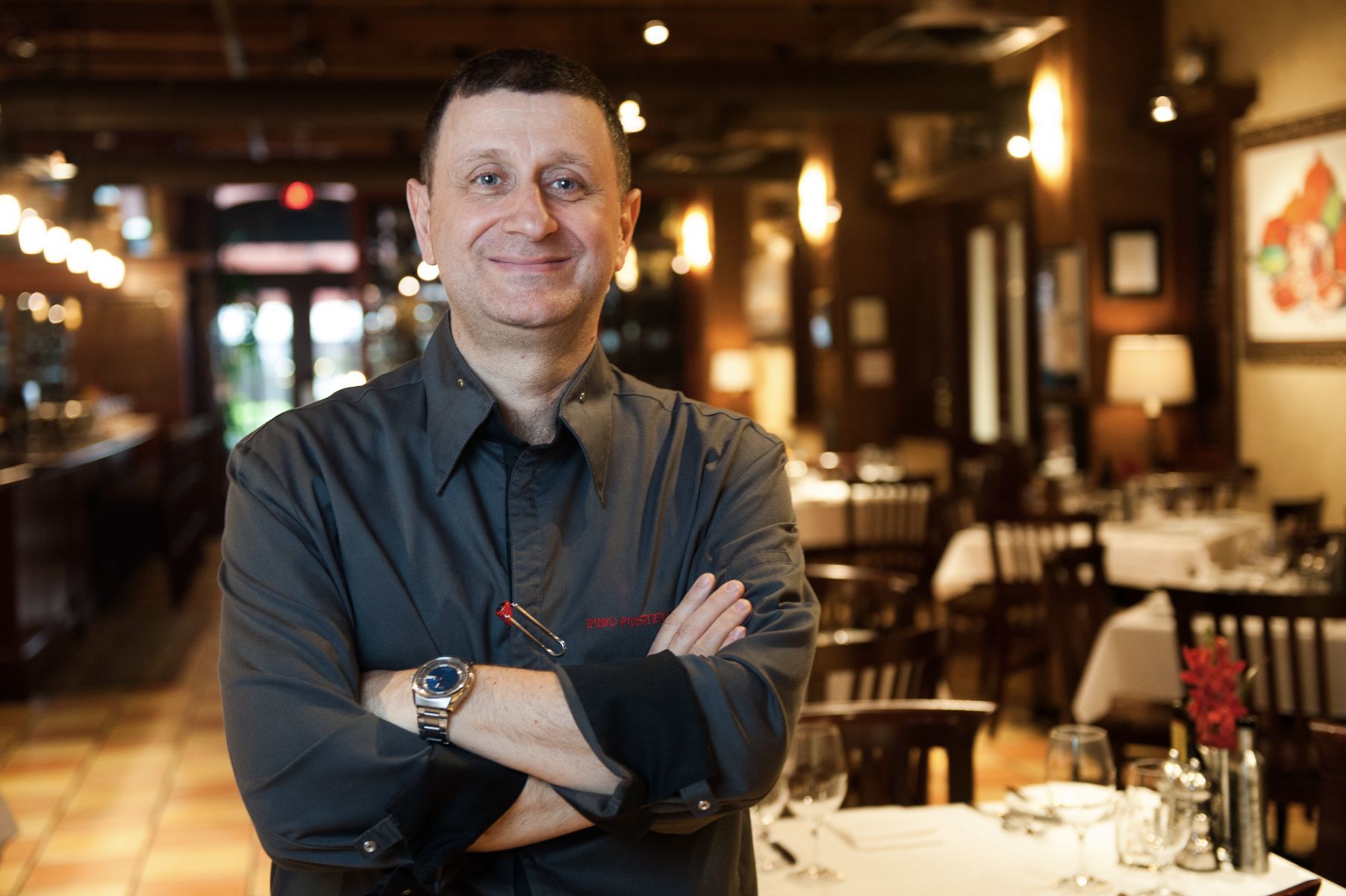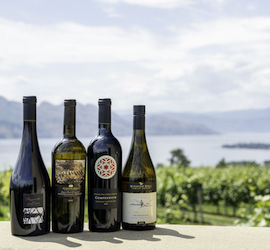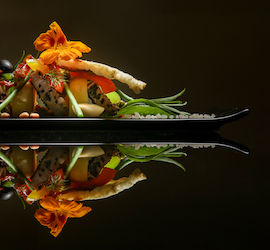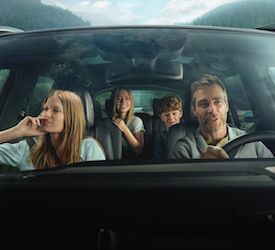A Conversation with Chef Pino Posteraro.
March 11 2021, Mercedes-Benz Vancouver

To anyone with some knowledge of Italian cooking and award-winning Vancouver restaurants, Chef Pino Posteraro needs no introduction. For over two decades, the visionary powerhouse has been carving out his place on the culinary scene at Cioppino’s and, long before that, with a career spent cooking around the world.
Chef Posteraro continues to innovate at every opportunity and still works 14-hour days. As he explains: “People know that going to Cioppino’s they will find Pino, because Pino’s always there.” In this interview, the tireless chef divulges what he grows in his garden, his favourite Vancouver restaurants, and the first place he wants to travel when lockdown is over (Hint: It’s in Italy).

Reflecting on 2020
Mercedes-Benz Vancouver: One of the main reasons you became a chef was to create happiness for people. During lockdown last year, what did you miss most about the day-to-day routine of restaurant life?
Pino Posteraro: The interaction with the people. Covid will stay with us forever, changing the way of human interaction. Being European—being Latin, not only Italian—there is that sense to greet each other by shaking hands, hugging each other, and that has definitely changed. Adapting to the new rules has, I think, changed a way of behaving for all of us in the future.
MBV: Last year, right before Covid hit, you had planned some renovations at the restaurant. Tell us about that timing.
PP: We closed on March 14 last year for a planned renovation. The week we closed, we nationally locked down. It was difficult timing, but we still managed to do amazing, gorgeous renovations.

Cioppino’s in Yaletown
MBV: Happily, patio season is coming up quickly. What can we expect to see on the menu this season, especially as we start to see more local produce coming to farmers’ markets?
PP: You nailed it about farmers’ markets. You will see an Italian-Mediterranean restaurant like Cioppino’s counting on the staples of organic farmers and local ingredients. Don’t expect to have traditional food, because there is nothing traditional about me. I’m Italian, I'm Canadian, I worked in Asia, and I would be bored to do a dish that’s been on the menu for 20 years. We do have staples on our menu that stay there, and that are part of the classic tradition, but we are a part of a movement of restaurants that are inclined to do food for the future. Tradition and evolution, that’s what I would say.
MBV: Is there a favourite item on the menu that everyone asks for, time and again?
PP: Yes. Pappardelle with veal cheeks and porcini mushrooms. I would never be able to take it off the menu. Or, local sablefish...
MBV: That reminds us that you did a great sablefish Instagram video during Covid lockdown, cooking and prepping in your kitchen—it was refreshing to watch.
PP: One of the main reasons I wanted to do that is I wanted to help the fishmongers [during Covid] when all of a sudden they had thousands of pounds of fish in the fridge, or the freezer. My main goal was to help. B.C. has a very good civic spirit to be helpful to each other, and I was very happy with how [the province] responded.

Staying Local
MBV: How do you carve out time to be creative? Do you have special places you go in the city to get away from it all?
PP: I have always been a very introspective person, but about four years ago I started to do transcendental meditation. That definitely helps out in a stressful job. I think my favourite spot is—well, reading a lot—and the commuting travel from North Van to the restaurant and back with some nice music. That allows me to think, be creative, and conceive new dishes.
MBV: You use figs from your garden in your own cooking. What are some of your other favourite things to grow in Vancouver?
PP: I have two bay trees that my wife and I transplanted—I can supply the whole restaurant. One pound of bay leaves is sold in America for $18. So, if a chef friend wants to harvest, they can come and do it for free. We also grow plums, cherries, Golden Delicious apples, and we try to do eggplants, peppers, and tomatoes. I am much more for the edible stuff, while my wife loves plants that give flowers. She deserves it, though—she is at home more, so she has first pick.
MBV: When you’re not eating your own cuisine, what restaurants do you like to support in Vancouver?
PP: For Chinese food, I go to Chef Tony in Richmond. For Thai food, Maenam—best Thai food in Canada, in my opinion. I go to Tojo’s, which I love, and he is a dear friend. I live on the North Shore, so I go for Greek Food at Mythos [Taverna]. But I have to be very honest. Because of the fact that we are thought to be frontliners, on the weekend I have been ordering food from local businesses instead of going to restaurants. Not because I am scared, but because I want to conform 100% to the Covid regulations. Sometimes it makes you a little bit unpopular… you know with my wife on Valentine's Day, she would expect us to go out, but no, this year I opened a bottle of wine and cooked from home. We’re all doing our part. We’re all like little islands, and if we work together we contribute to the bigger picture.

Looking Forward
MBV: When international travel opens up again, where is the first place you’ll go?
PP: My little home town of Lago. This little town in Calabria is 2,000 souls, and I want to [reconnect] humbly in my roots with my siblings and friends, eating uncontaminated food, playing cards. Very simple. It is my favourite vacation of all time.
MBV: When you have to stay closer to home, where do you explore in BC?
PP: In the past, I’ve been supporting local communities as a chef. For example, doing cooking events with fellow chefs on Salt Spring Island, and helping them with a commercial abattoir because they didn’t have one. Going to Comox to do the seafood festival, or going to Whistler and helping them judge the international oyster competition. And definitely the Okanagan. I love the Okanagan.
MBV: What are you most looking forward to this year?
PP: I am truly hoping that this pandemic will be put behind and people will start to live normally instead of surviving. Honestly, it comes from my heart because I want young people to go out and meet with their friends. We are who we are because we had positive and negative experiences [in our youth] that really made us, forged us, molded us into the individuals we are. Not only the ambience at home, but our interaction with other humans. Now, we’ve been pushed to be isolated and just think about ourselves and not the community. So I really hope that things open up, and we work together to get out of this situation together.
MBV: You have maintained success for so long with your work. What is an important lesson you have learned along the way?
PP: Number one is to be unconsciously conscious, to know that the success you have is just a temporary thing that will only continue if you keep humble, be kind, and keep working hard… You know, I was cooking with Frank Sinatra at his house in Palm Springs, in 1992 and I asked him a question: I said, “Mr. Sinatra?’ He said, “Frank, call me Frank.” I asked him, “What is the key to your success?” He said to me, “Kid, remember one thing: you are as good as your last performance.” … So, abnegation, tireless hours, and being humble. There is no gimmick here.
Editor’s Note: This interview has been edited and condensed.



